Corporation Law: Duties and Liabilities of Directors
VerifiedAdded on 2023/01/16
|10
|2960
|88
AI Summary
This document discusses the duties and liabilities of directors under Corporation Law. It covers the fiduciary and statutory duties, safe harbor provisions, and the protection available to directors. The document also includes a case study on Peter Daly and Linchpin Capital.
Contribute Materials
Your contribution can guide someone’s learning journey. Share your
documents today.
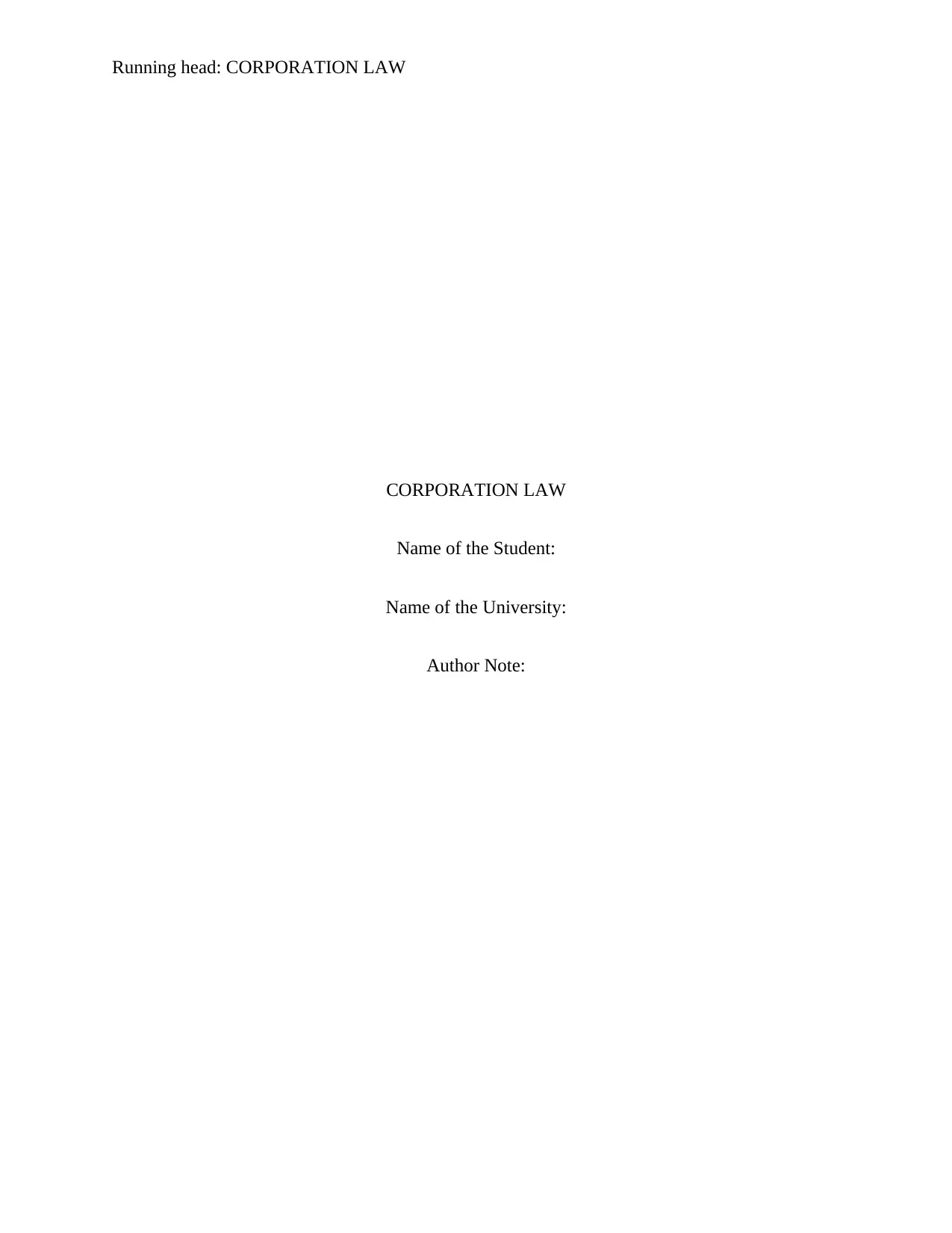
Running head: CORPORATION LAW
CORPORATION LAW
Name of the Student:
Name of the University:
Author Note:
CORPORATION LAW
Name of the Student:
Name of the University:
Author Note:
Secure Best Marks with AI Grader
Need help grading? Try our AI Grader for instant feedback on your assignments.
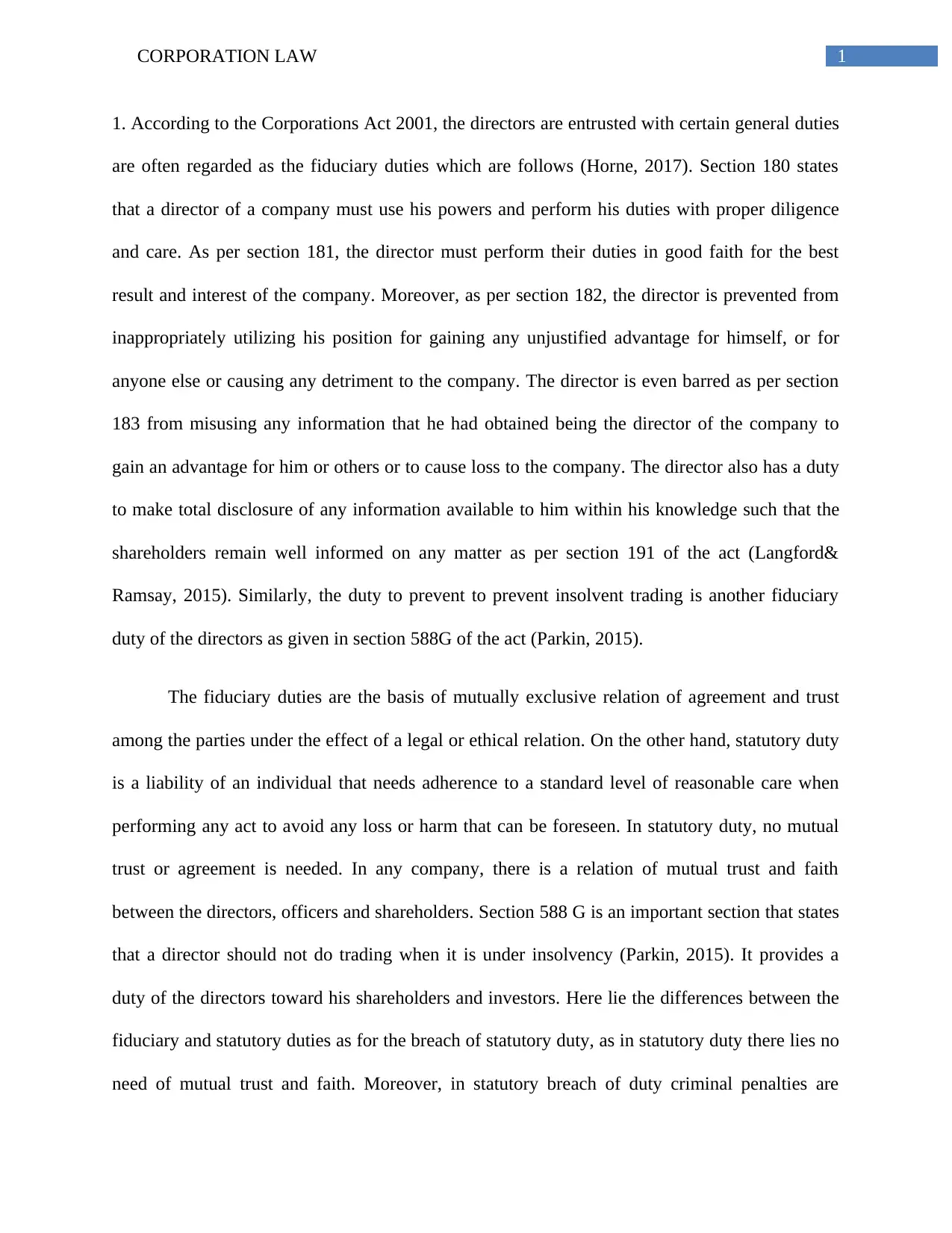
1CORPORATION LAW
1. According to the Corporations Act 2001, the directors are entrusted with certain general duties
are often regarded as the fiduciary duties which are follows (Horne, 2017). Section 180 states
that a director of a company must use his powers and perform his duties with proper diligence
and care. As per section 181, the director must perform their duties in good faith for the best
result and interest of the company. Moreover, as per section 182, the director is prevented from
inappropriately utilizing his position for gaining any unjustified advantage for himself, or for
anyone else or causing any detriment to the company. The director is even barred as per section
183 from misusing any information that he had obtained being the director of the company to
gain an advantage for him or others or to cause loss to the company. The director also has a duty
to make total disclosure of any information available to him within his knowledge such that the
shareholders remain well informed on any matter as per section 191 of the act (Langford&
Ramsay, 2015). Similarly, the duty to prevent to prevent insolvent trading is another fiduciary
duty of the directors as given in section 588G of the act (Parkin, 2015).
The fiduciary duties are the basis of mutually exclusive relation of agreement and trust
among the parties under the effect of a legal or ethical relation. On the other hand, statutory duty
is a liability of an individual that needs adherence to a standard level of reasonable care when
performing any act to avoid any loss or harm that can be foreseen. In statutory duty, no mutual
trust or agreement is needed. In any company, there is a relation of mutual trust and faith
between the directors, officers and shareholders. Section 588 G is an important section that states
that a director should not do trading when it is under insolvency (Parkin, 2015). It provides a
duty of the directors toward his shareholders and investors. Here lie the differences between the
fiduciary and statutory duties as for the breach of statutory duty, as in statutory duty there lies no
need of mutual trust and faith. Moreover, in statutory breach of duty criminal penalties are
1. According to the Corporations Act 2001, the directors are entrusted with certain general duties
are often regarded as the fiduciary duties which are follows (Horne, 2017). Section 180 states
that a director of a company must use his powers and perform his duties with proper diligence
and care. As per section 181, the director must perform their duties in good faith for the best
result and interest of the company. Moreover, as per section 182, the director is prevented from
inappropriately utilizing his position for gaining any unjustified advantage for himself, or for
anyone else or causing any detriment to the company. The director is even barred as per section
183 from misusing any information that he had obtained being the director of the company to
gain an advantage for him or others or to cause loss to the company. The director also has a duty
to make total disclosure of any information available to him within his knowledge such that the
shareholders remain well informed on any matter as per section 191 of the act (Langford&
Ramsay, 2015). Similarly, the duty to prevent to prevent insolvent trading is another fiduciary
duty of the directors as given in section 588G of the act (Parkin, 2015).
The fiduciary duties are the basis of mutually exclusive relation of agreement and trust
among the parties under the effect of a legal or ethical relation. On the other hand, statutory duty
is a liability of an individual that needs adherence to a standard level of reasonable care when
performing any act to avoid any loss or harm that can be foreseen. In statutory duty, no mutual
trust or agreement is needed. In any company, there is a relation of mutual trust and faith
between the directors, officers and shareholders. Section 588 G is an important section that states
that a director should not do trading when it is under insolvency (Parkin, 2015). It provides a
duty of the directors toward his shareholders and investors. Here lie the differences between the
fiduciary and statutory duties as for the breach of statutory duty, as in statutory duty there lies no
need of mutual trust and faith. Moreover, in statutory breach of duty criminal penalties are
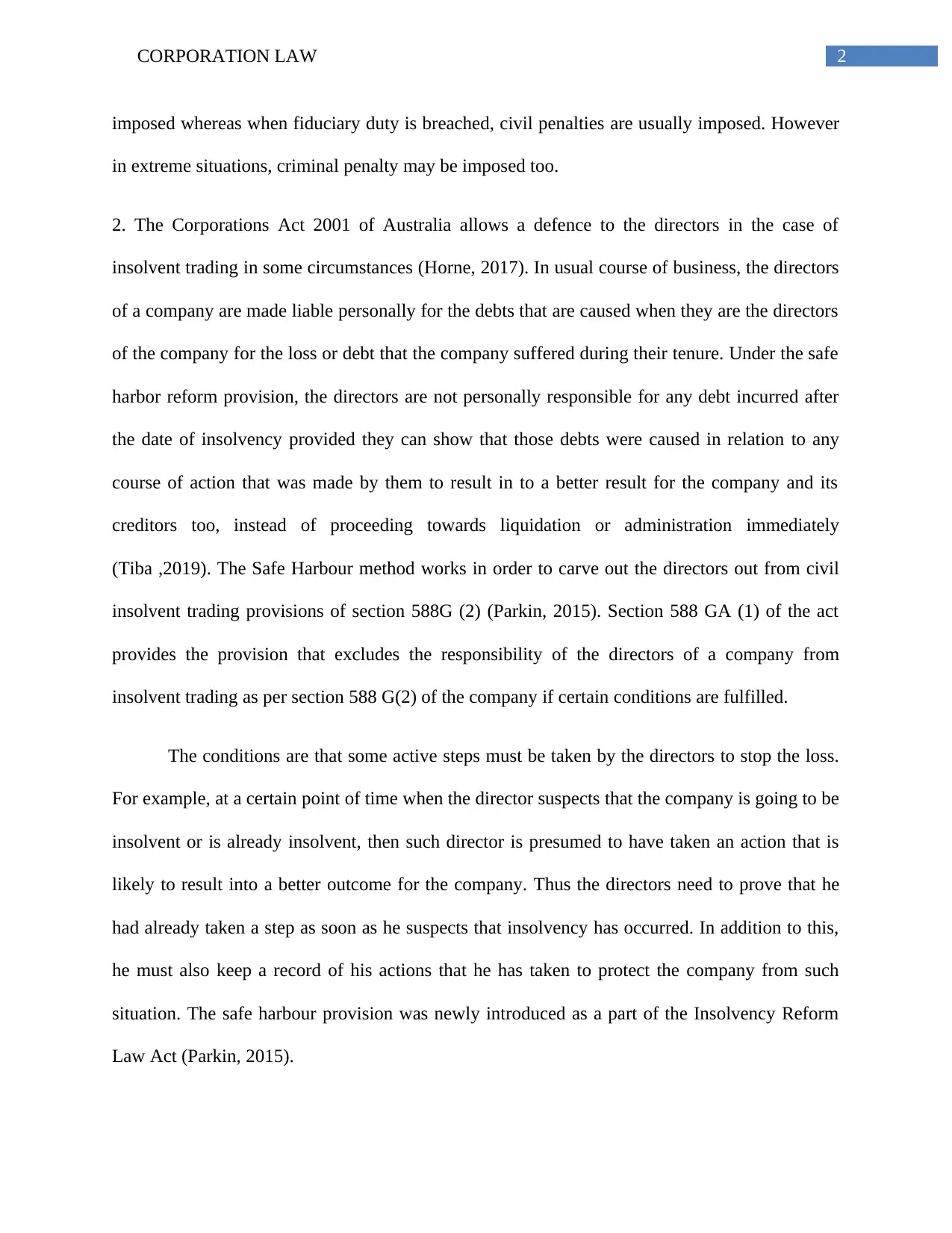
2CORPORATION LAW
imposed whereas when fiduciary duty is breached, civil penalties are usually imposed. However
in extreme situations, criminal penalty may be imposed too.
2. The Corporations Act 2001 of Australia allows a defence to the directors in the case of
insolvent trading in some circumstances (Horne, 2017). In usual course of business, the directors
of a company are made liable personally for the debts that are caused when they are the directors
of the company for the loss or debt that the company suffered during their tenure. Under the safe
harbor reform provision, the directors are not personally responsible for any debt incurred after
the date of insolvency provided they can show that those debts were caused in relation to any
course of action that was made by them to result in to a better result for the company and its
creditors too, instead of proceeding towards liquidation or administration immediately
(Tiba ,2019). The Safe Harbour method works in order to carve out the directors out from civil
insolvent trading provisions of section 588G (2) (Parkin, 2015). Section 588 GA (1) of the act
provides the provision that excludes the responsibility of the directors of a company from
insolvent trading as per section 588 G(2) of the company if certain conditions are fulfilled.
The conditions are that some active steps must be taken by the directors to stop the loss.
For example, at a certain point of time when the director suspects that the company is going to be
insolvent or is already insolvent, then such director is presumed to have taken an action that is
likely to result into a better outcome for the company. Thus the directors need to prove that he
had already taken a step as soon as he suspects that insolvency has occurred. In addition to this,
he must also keep a record of his actions that he has taken to protect the company from such
situation. The safe harbour provision was newly introduced as a part of the Insolvency Reform
Law Act (Parkin, 2015).
imposed whereas when fiduciary duty is breached, civil penalties are usually imposed. However
in extreme situations, criminal penalty may be imposed too.
2. The Corporations Act 2001 of Australia allows a defence to the directors in the case of
insolvent trading in some circumstances (Horne, 2017). In usual course of business, the directors
of a company are made liable personally for the debts that are caused when they are the directors
of the company for the loss or debt that the company suffered during their tenure. Under the safe
harbor reform provision, the directors are not personally responsible for any debt incurred after
the date of insolvency provided they can show that those debts were caused in relation to any
course of action that was made by them to result in to a better result for the company and its
creditors too, instead of proceeding towards liquidation or administration immediately
(Tiba ,2019). The Safe Harbour method works in order to carve out the directors out from civil
insolvent trading provisions of section 588G (2) (Parkin, 2015). Section 588 GA (1) of the act
provides the provision that excludes the responsibility of the directors of a company from
insolvent trading as per section 588 G(2) of the company if certain conditions are fulfilled.
The conditions are that some active steps must be taken by the directors to stop the loss.
For example, at a certain point of time when the director suspects that the company is going to be
insolvent or is already insolvent, then such director is presumed to have taken an action that is
likely to result into a better outcome for the company. Thus the directors need to prove that he
had already taken a step as soon as he suspects that insolvency has occurred. In addition to this,
he must also keep a record of his actions that he has taken to protect the company from such
situation. The safe harbour provision was newly introduced as a part of the Insolvency Reform
Law Act (Parkin, 2015).
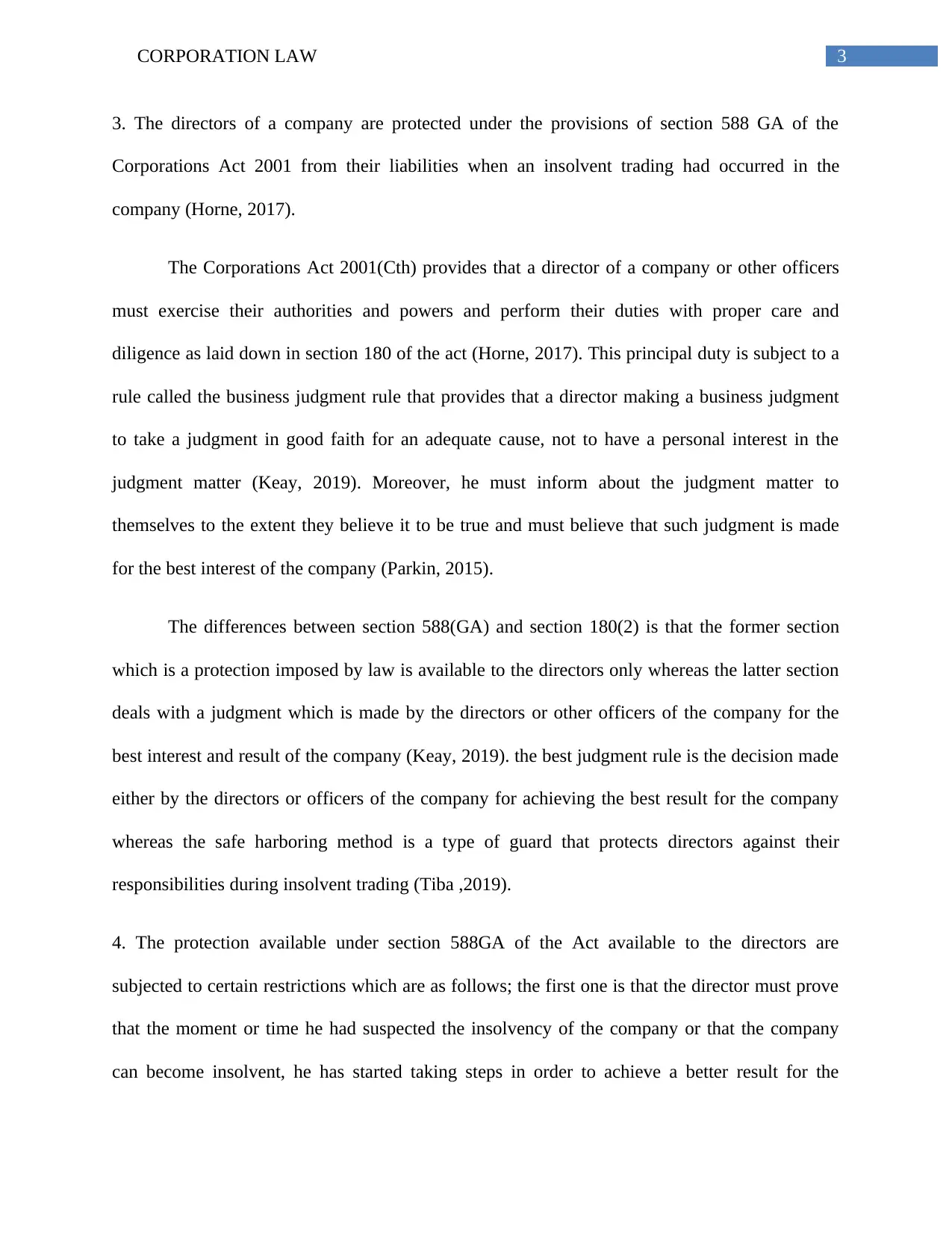
3CORPORATION LAW
3. The directors of a company are protected under the provisions of section 588 GA of the
Corporations Act 2001 from their liabilities when an insolvent trading had occurred in the
company (Horne, 2017).
The Corporations Act 2001(Cth) provides that a director of a company or other officers
must exercise their authorities and powers and perform their duties with proper care and
diligence as laid down in section 180 of the act (Horne, 2017). This principal duty is subject to a
rule called the business judgment rule that provides that a director making a business judgment
to take a judgment in good faith for an adequate cause, not to have a personal interest in the
judgment matter (Keay, 2019). Moreover, he must inform about the judgment matter to
themselves to the extent they believe it to be true and must believe that such judgment is made
for the best interest of the company (Parkin, 2015).
The differences between section 588(GA) and section 180(2) is that the former section
which is a protection imposed by law is available to the directors only whereas the latter section
deals with a judgment which is made by the directors or other officers of the company for the
best interest and result of the company (Keay, 2019). the best judgment rule is the decision made
either by the directors or officers of the company for achieving the best result for the company
whereas the safe harboring method is a type of guard that protects directors against their
responsibilities during insolvent trading (Tiba ,2019).
4. The protection available under section 588GA of the Act available to the directors are
subjected to certain restrictions which are as follows; the first one is that the director must prove
that the moment or time he had suspected the insolvency of the company or that the company
can become insolvent, he has started taking steps in order to achieve a better result for the
3. The directors of a company are protected under the provisions of section 588 GA of the
Corporations Act 2001 from their liabilities when an insolvent trading had occurred in the
company (Horne, 2017).
The Corporations Act 2001(Cth) provides that a director of a company or other officers
must exercise their authorities and powers and perform their duties with proper care and
diligence as laid down in section 180 of the act (Horne, 2017). This principal duty is subject to a
rule called the business judgment rule that provides that a director making a business judgment
to take a judgment in good faith for an adequate cause, not to have a personal interest in the
judgment matter (Keay, 2019). Moreover, he must inform about the judgment matter to
themselves to the extent they believe it to be true and must believe that such judgment is made
for the best interest of the company (Parkin, 2015).
The differences between section 588(GA) and section 180(2) is that the former section
which is a protection imposed by law is available to the directors only whereas the latter section
deals with a judgment which is made by the directors or other officers of the company for the
best interest and result of the company (Keay, 2019). the best judgment rule is the decision made
either by the directors or officers of the company for achieving the best result for the company
whereas the safe harboring method is a type of guard that protects directors against their
responsibilities during insolvent trading (Tiba ,2019).
4. The protection available under section 588GA of the Act available to the directors are
subjected to certain restrictions which are as follows; the first one is that the director must prove
that the moment or time he had suspected the insolvency of the company or that the company
can become insolvent, he has started taking steps in order to achieve a better result for the
Secure Best Marks with AI Grader
Need help grading? Try our AI Grader for instant feedback on your assignments.
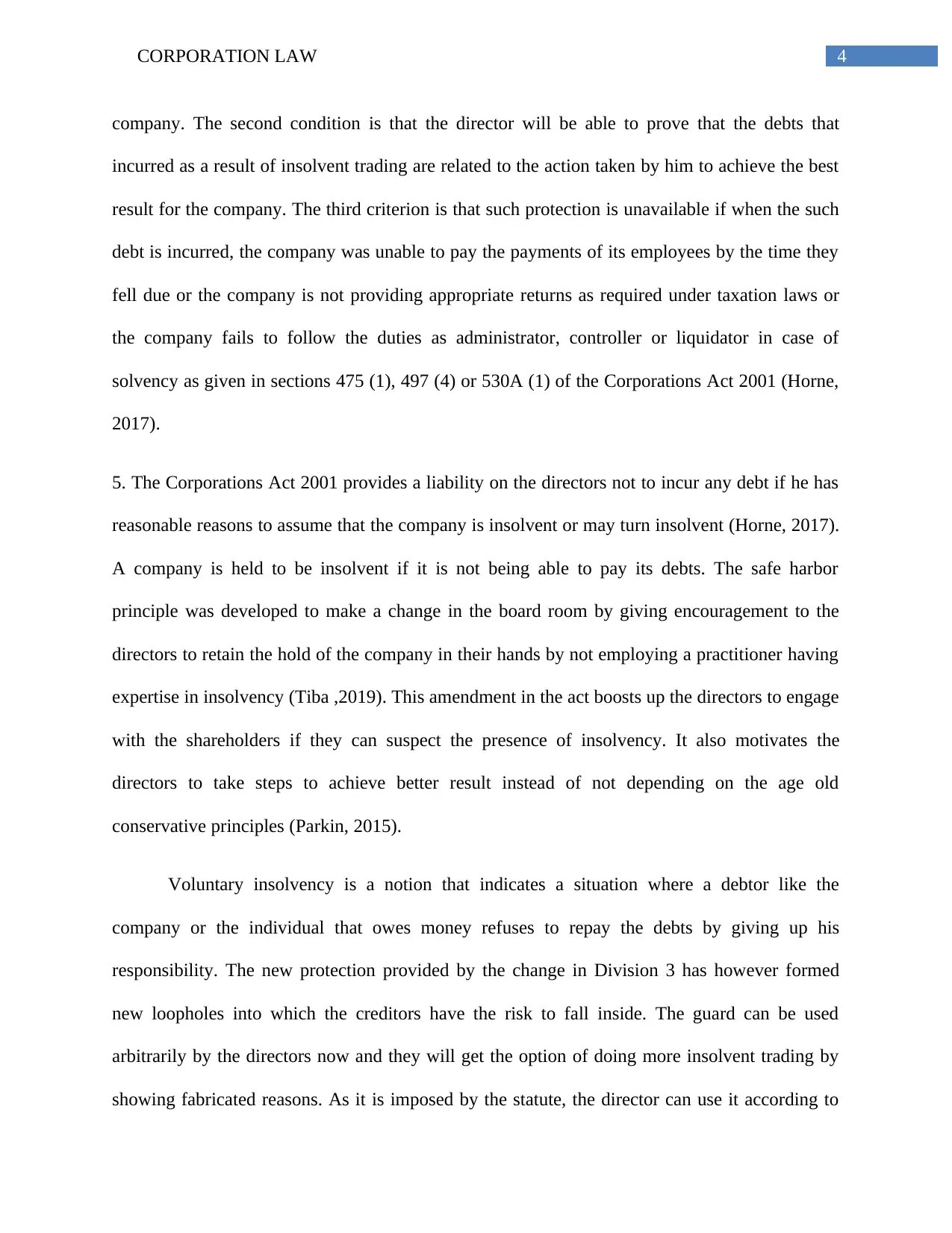
4CORPORATION LAW
company. The second condition is that the director will be able to prove that the debts that
incurred as a result of insolvent trading are related to the action taken by him to achieve the best
result for the company. The third criterion is that such protection is unavailable if when the such
debt is incurred, the company was unable to pay the payments of its employees by the time they
fell due or the company is not providing appropriate returns as required under taxation laws or
the company fails to follow the duties as administrator, controller or liquidator in case of
solvency as given in sections 475 (1), 497 (4) or 530A (1) of the Corporations Act 2001 (Horne,
2017).
5. The Corporations Act 2001 provides a liability on the directors not to incur any debt if he has
reasonable reasons to assume that the company is insolvent or may turn insolvent (Horne, 2017).
A company is held to be insolvent if it is not being able to pay its debts. The safe harbor
principle was developed to make a change in the board room by giving encouragement to the
directors to retain the hold of the company in their hands by not employing a practitioner having
expertise in insolvency (Tiba ,2019). This amendment in the act boosts up the directors to engage
with the shareholders if they can suspect the presence of insolvency. It also motivates the
directors to take steps to achieve better result instead of not depending on the age old
conservative principles (Parkin, 2015).
Voluntary insolvency is a notion that indicates a situation where a debtor like the
company or the individual that owes money refuses to repay the debts by giving up his
responsibility. The new protection provided by the change in Division 3 has however formed
new loopholes into which the creditors have the risk to fall inside. The guard can be used
arbitrarily by the directors now and they will get the option of doing more insolvent trading by
showing fabricated reasons. As it is imposed by the statute, the director can use it according to
company. The second condition is that the director will be able to prove that the debts that
incurred as a result of insolvent trading are related to the action taken by him to achieve the best
result for the company. The third criterion is that such protection is unavailable if when the such
debt is incurred, the company was unable to pay the payments of its employees by the time they
fell due or the company is not providing appropriate returns as required under taxation laws or
the company fails to follow the duties as administrator, controller or liquidator in case of
solvency as given in sections 475 (1), 497 (4) or 530A (1) of the Corporations Act 2001 (Horne,
2017).
5. The Corporations Act 2001 provides a liability on the directors not to incur any debt if he has
reasonable reasons to assume that the company is insolvent or may turn insolvent (Horne, 2017).
A company is held to be insolvent if it is not being able to pay its debts. The safe harbor
principle was developed to make a change in the board room by giving encouragement to the
directors to retain the hold of the company in their hands by not employing a practitioner having
expertise in insolvency (Tiba ,2019). This amendment in the act boosts up the directors to engage
with the shareholders if they can suspect the presence of insolvency. It also motivates the
directors to take steps to achieve better result instead of not depending on the age old
conservative principles (Parkin, 2015).
Voluntary insolvency is a notion that indicates a situation where a debtor like the
company or the individual that owes money refuses to repay the debts by giving up his
responsibility. The new protection provided by the change in Division 3 has however formed
new loopholes into which the creditors have the risk to fall inside. The guard can be used
arbitrarily by the directors now and they will get the option of doing more insolvent trading by
showing fabricated reasons. As it is imposed by the statute, the director can use it according to
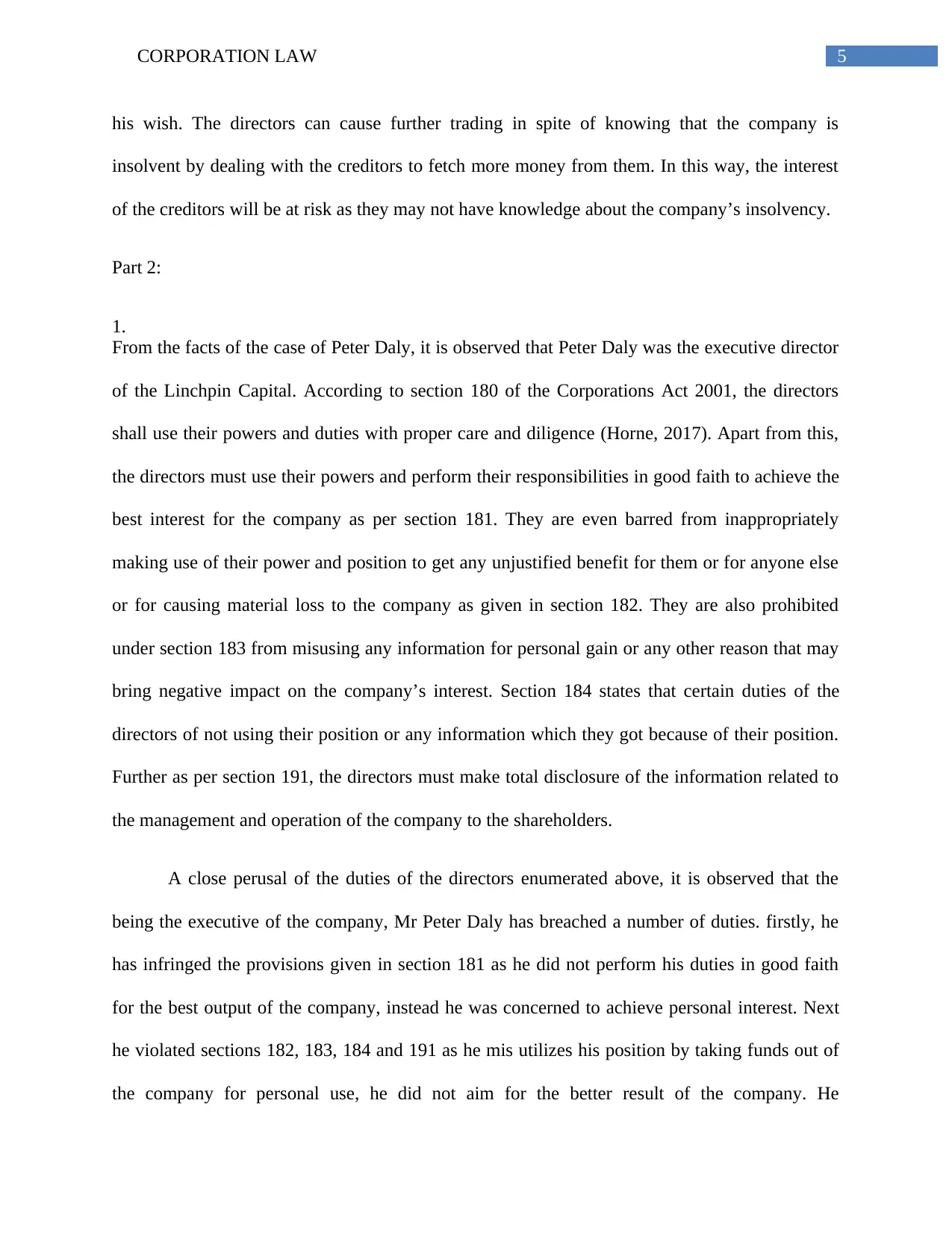
5CORPORATION LAW
his wish. The directors can cause further trading in spite of knowing that the company is
insolvent by dealing with the creditors to fetch more money from them. In this way, the interest
of the creditors will be at risk as they may not have knowledge about the company’s insolvency.
Part 2:
1.
From the facts of the case of Peter Daly, it is observed that Peter Daly was the executive director
of the Linchpin Capital. According to section 180 of the Corporations Act 2001, the directors
shall use their powers and duties with proper care and diligence (Horne, 2017). Apart from this,
the directors must use their powers and perform their responsibilities in good faith to achieve the
best interest for the company as per section 181. They are even barred from inappropriately
making use of their power and position to get any unjustified benefit for them or for anyone else
or for causing material loss to the company as given in section 182. They are also prohibited
under section 183 from misusing any information for personal gain or any other reason that may
bring negative impact on the company’s interest. Section 184 states that certain duties of the
directors of not using their position or any information which they got because of their position.
Further as per section 191, the directors must make total disclosure of the information related to
the management and operation of the company to the shareholders.
A close perusal of the duties of the directors enumerated above, it is observed that the
being the executive of the company, Mr Peter Daly has breached a number of duties. firstly, he
has infringed the provisions given in section 181 as he did not perform his duties in good faith
for the best output of the company, instead he was concerned to achieve personal interest. Next
he violated sections 182, 183, 184 and 191 as he mis utilizes his position by taking funds out of
the company for personal use, he did not aim for the better result of the company. He
his wish. The directors can cause further trading in spite of knowing that the company is
insolvent by dealing with the creditors to fetch more money from them. In this way, the interest
of the creditors will be at risk as they may not have knowledge about the company’s insolvency.
Part 2:
1.
From the facts of the case of Peter Daly, it is observed that Peter Daly was the executive director
of the Linchpin Capital. According to section 180 of the Corporations Act 2001, the directors
shall use their powers and duties with proper care and diligence (Horne, 2017). Apart from this,
the directors must use their powers and perform their responsibilities in good faith to achieve the
best interest for the company as per section 181. They are even barred from inappropriately
making use of their power and position to get any unjustified benefit for them or for anyone else
or for causing material loss to the company as given in section 182. They are also prohibited
under section 183 from misusing any information for personal gain or any other reason that may
bring negative impact on the company’s interest. Section 184 states that certain duties of the
directors of not using their position or any information which they got because of their position.
Further as per section 191, the directors must make total disclosure of the information related to
the management and operation of the company to the shareholders.
A close perusal of the duties of the directors enumerated above, it is observed that the
being the executive of the company, Mr Peter Daly has breached a number of duties. firstly, he
has infringed the provisions given in section 181 as he did not perform his duties in good faith
for the best output of the company, instead he was concerned to achieve personal interest. Next
he violated sections 182, 183, 184 and 191 as he mis utilizes his position by taking funds out of
the company for personal use, he did not aim for the better result of the company. He
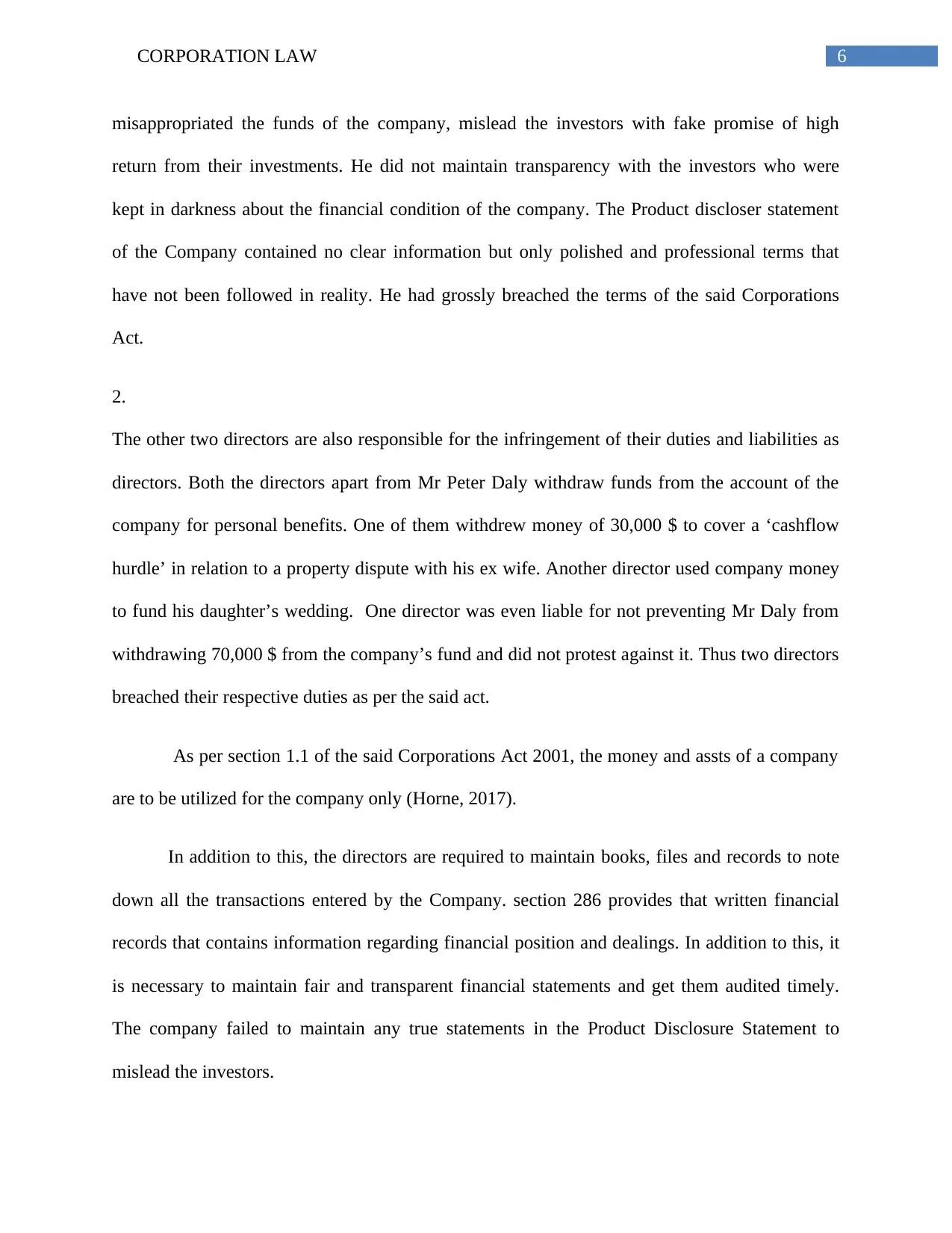
6CORPORATION LAW
misappropriated the funds of the company, mislead the investors with fake promise of high
return from their investments. He did not maintain transparency with the investors who were
kept in darkness about the financial condition of the company. The Product discloser statement
of the Company contained no clear information but only polished and professional terms that
have not been followed in reality. He had grossly breached the terms of the said Corporations
Act.
2.
The other two directors are also responsible for the infringement of their duties and liabilities as
directors. Both the directors apart from Mr Peter Daly withdraw funds from the account of the
company for personal benefits. One of them withdrew money of 30,000 $ to cover a ‘cashflow
hurdle’ in relation to a property dispute with his ex wife. Another director used company money
to fund his daughter’s wedding. One director was even liable for not preventing Mr Daly from
withdrawing 70,000 $ from the company’s fund and did not protest against it. Thus two directors
breached their respective duties as per the said act.
As per section 1.1 of the said Corporations Act 2001, the money and assts of a company
are to be utilized for the company only (Horne, 2017).
In addition to this, the directors are required to maintain books, files and records to note
down all the transactions entered by the Company. section 286 provides that written financial
records that contains information regarding financial position and dealings. In addition to this, it
is necessary to maintain fair and transparent financial statements and get them audited timely.
The company failed to maintain any true statements in the Product Disclosure Statement to
mislead the investors.
misappropriated the funds of the company, mislead the investors with fake promise of high
return from their investments. He did not maintain transparency with the investors who were
kept in darkness about the financial condition of the company. The Product discloser statement
of the Company contained no clear information but only polished and professional terms that
have not been followed in reality. He had grossly breached the terms of the said Corporations
Act.
2.
The other two directors are also responsible for the infringement of their duties and liabilities as
directors. Both the directors apart from Mr Peter Daly withdraw funds from the account of the
company for personal benefits. One of them withdrew money of 30,000 $ to cover a ‘cashflow
hurdle’ in relation to a property dispute with his ex wife. Another director used company money
to fund his daughter’s wedding. One director was even liable for not preventing Mr Daly from
withdrawing 70,000 $ from the company’s fund and did not protest against it. Thus two directors
breached their respective duties as per the said act.
As per section 1.1 of the said Corporations Act 2001, the money and assts of a company
are to be utilized for the company only (Horne, 2017).
In addition to this, the directors are required to maintain books, files and records to note
down all the transactions entered by the Company. section 286 provides that written financial
records that contains information regarding financial position and dealings. In addition to this, it
is necessary to maintain fair and transparent financial statements and get them audited timely.
The company failed to maintain any true statements in the Product Disclosure Statement to
mislead the investors.
Paraphrase This Document
Need a fresh take? Get an instant paraphrase of this document with our AI Paraphraser
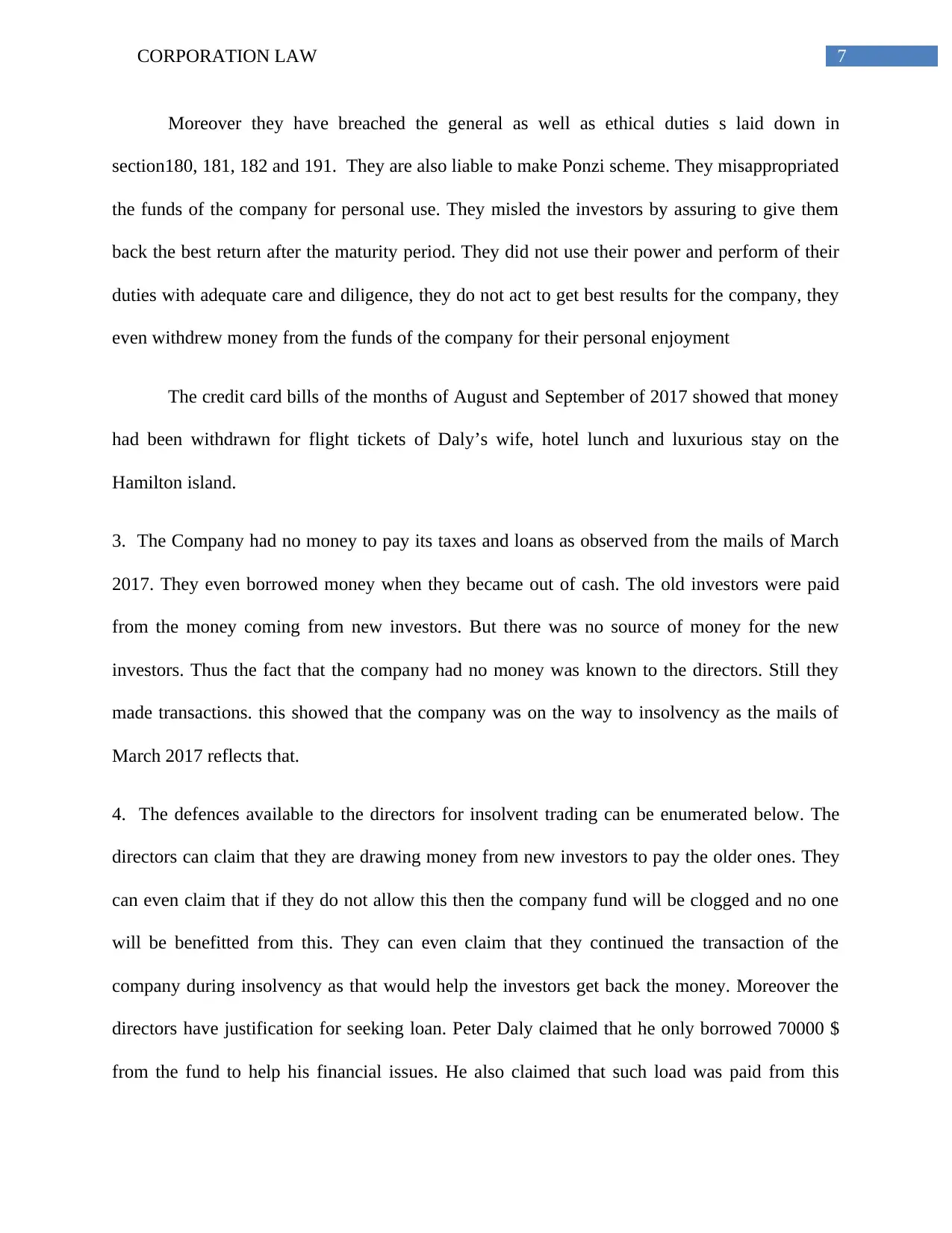
7CORPORATION LAW
Moreover they have breached the general as well as ethical duties s laid down in
section180, 181, 182 and 191. They are also liable to make Ponzi scheme. They misappropriated
the funds of the company for personal use. They misled the investors by assuring to give them
back the best return after the maturity period. They did not use their power and perform of their
duties with adequate care and diligence, they do not act to get best results for the company, they
even withdrew money from the funds of the company for their personal enjoyment
The credit card bills of the months of August and September of 2017 showed that money
had been withdrawn for flight tickets of Daly’s wife, hotel lunch and luxurious stay on the
Hamilton island.
3. The Company had no money to pay its taxes and loans as observed from the mails of March
2017. They even borrowed money when they became out of cash. The old investors were paid
from the money coming from new investors. But there was no source of money for the new
investors. Thus the fact that the company had no money was known to the directors. Still they
made transactions. this showed that the company was on the way to insolvency as the mails of
March 2017 reflects that.
4. The defences available to the directors for insolvent trading can be enumerated below. The
directors can claim that they are drawing money from new investors to pay the older ones. They
can even claim that if they do not allow this then the company fund will be clogged and no one
will be benefitted from this. They can even claim that they continued the transaction of the
company during insolvency as that would help the investors get back the money. Moreover the
directors have justification for seeking loan. Peter Daly claimed that he only borrowed 70000 $
from the fund to help his financial issues. He also claimed that such load was paid from this
Moreover they have breached the general as well as ethical duties s laid down in
section180, 181, 182 and 191. They are also liable to make Ponzi scheme. They misappropriated
the funds of the company for personal use. They misled the investors by assuring to give them
back the best return after the maturity period. They did not use their power and perform of their
duties with adequate care and diligence, they do not act to get best results for the company, they
even withdrew money from the funds of the company for their personal enjoyment
The credit card bills of the months of August and September of 2017 showed that money
had been withdrawn for flight tickets of Daly’s wife, hotel lunch and luxurious stay on the
Hamilton island.
3. The Company had no money to pay its taxes and loans as observed from the mails of March
2017. They even borrowed money when they became out of cash. The old investors were paid
from the money coming from new investors. But there was no source of money for the new
investors. Thus the fact that the company had no money was known to the directors. Still they
made transactions. this showed that the company was on the way to insolvency as the mails of
March 2017 reflects that.
4. The defences available to the directors for insolvent trading can be enumerated below. The
directors can claim that they are drawing money from new investors to pay the older ones. They
can even claim that if they do not allow this then the company fund will be clogged and no one
will be benefitted from this. They can even claim that they continued the transaction of the
company during insolvency as that would help the investors get back the money. Moreover the
directors have justification for seeking loan. Peter Daly claimed that he only borrowed 70000 $
from the fund to help his financial issues. He also claimed that such load was paid from this
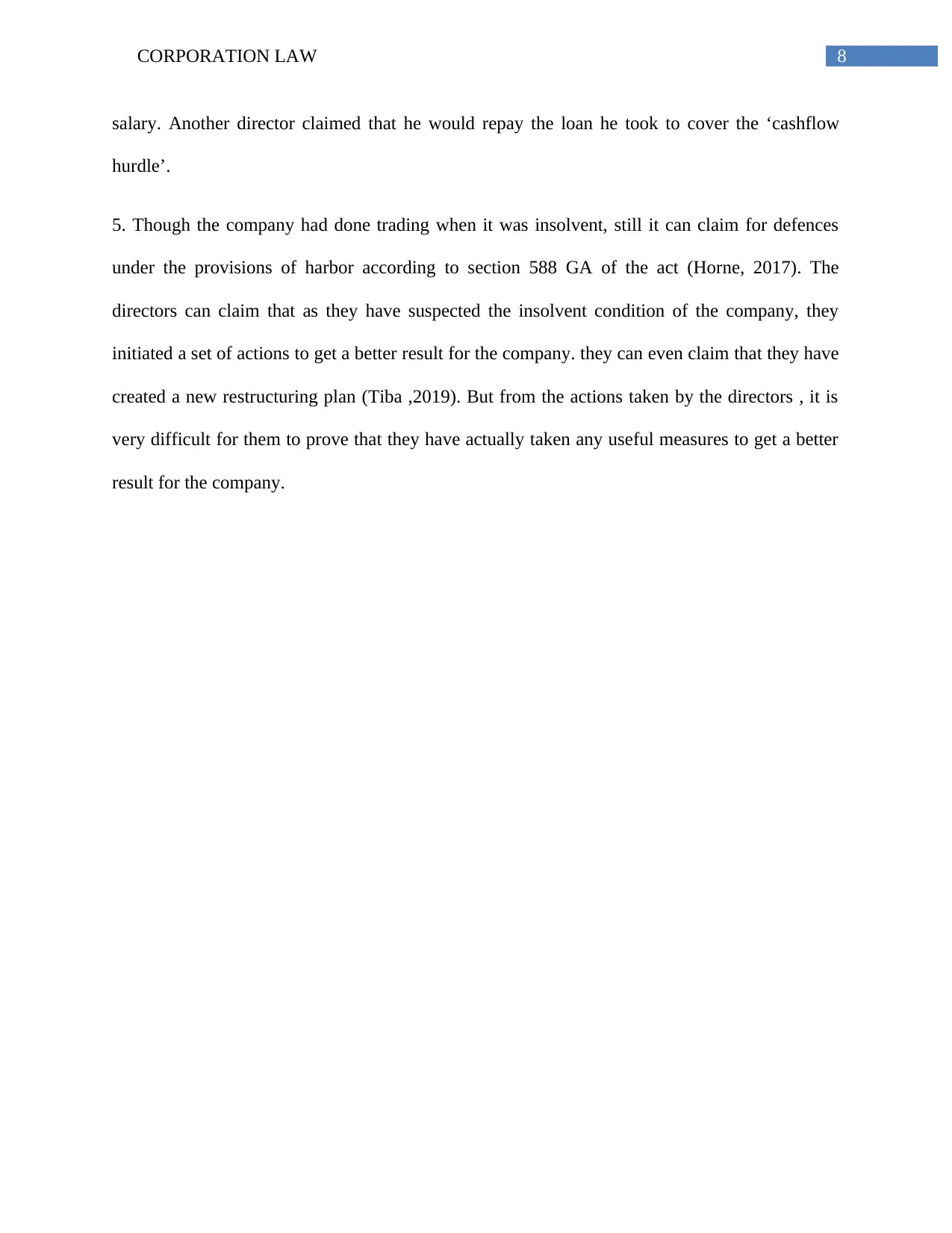
8CORPORATION LAW
salary. Another director claimed that he would repay the loan he took to cover the ‘cashflow
hurdle’.
5. Though the company had done trading when it was insolvent, still it can claim for defences
under the provisions of harbor according to section 588 GA of the act (Horne, 2017). The
directors can claim that as they have suspected the insolvent condition of the company, they
initiated a set of actions to get a better result for the company. they can even claim that they have
created a new restructuring plan (Tiba ,2019). But from the actions taken by the directors , it is
very difficult for them to prove that they have actually taken any useful measures to get a better
result for the company.
salary. Another director claimed that he would repay the loan he took to cover the ‘cashflow
hurdle’.
5. Though the company had done trading when it was insolvent, still it can claim for defences
under the provisions of harbor according to section 588 GA of the act (Horne, 2017). The
directors can claim that as they have suspected the insolvent condition of the company, they
initiated a set of actions to get a better result for the company. they can even claim that they have
created a new restructuring plan (Tiba ,2019). But from the actions taken by the directors , it is
very difficult for them to prove that they have actually taken any useful measures to get a better
result for the company.
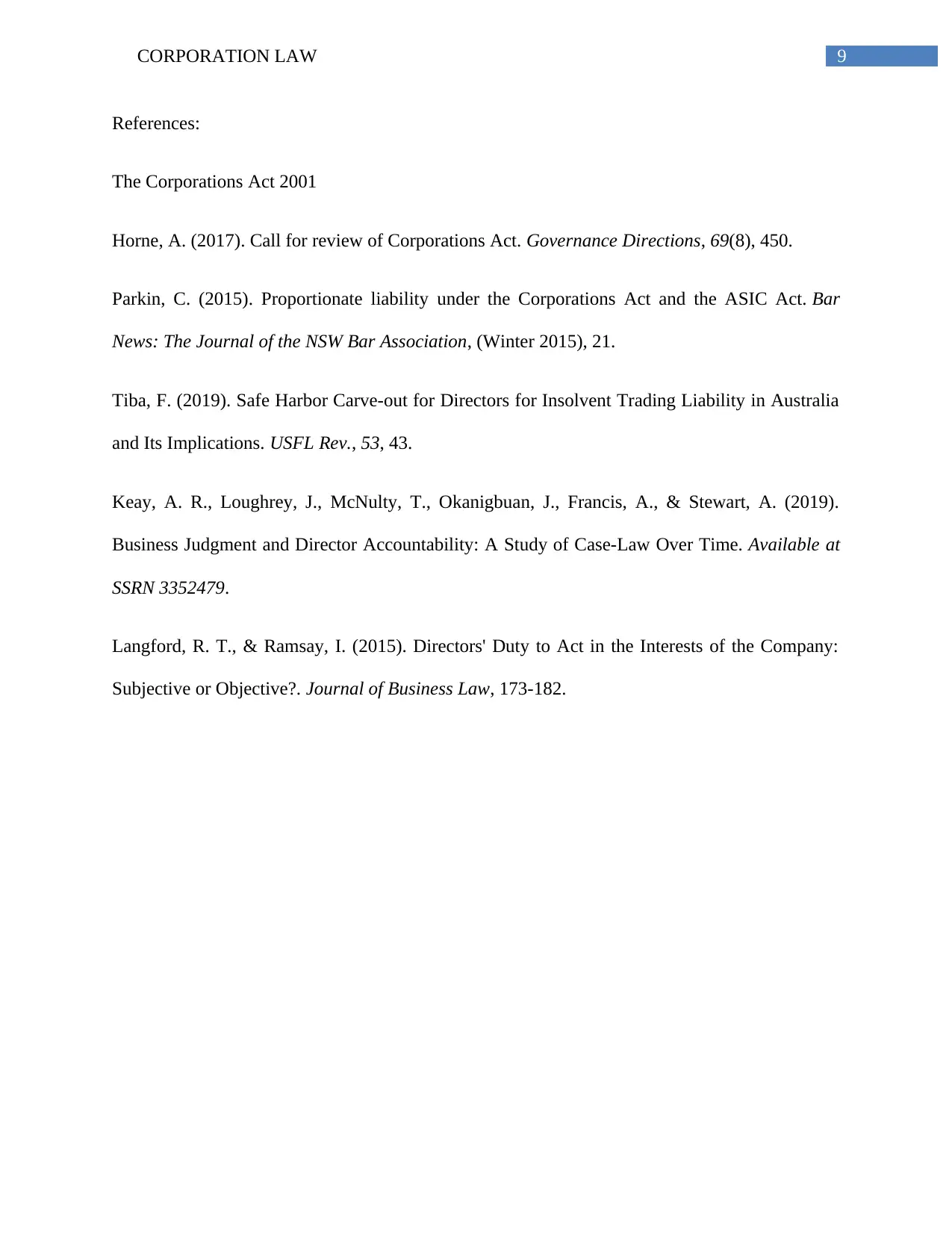
9CORPORATION LAW
References:
The Corporations Act 2001
Horne, A. (2017). Call for review of Corporations Act. Governance Directions, 69(8), 450.
Parkin, C. (2015). Proportionate liability under the Corporations Act and the ASIC Act. Bar
News: The Journal of the NSW Bar Association, (Winter 2015), 21.
Tiba, F. (2019). Safe Harbor Carve-out for Directors for Insolvent Trading Liability in Australia
and Its Implications. USFL Rev., 53, 43.
Keay, A. R., Loughrey, J., McNulty, T., Okanigbuan, J., Francis, A., & Stewart, A. (2019).
Business Judgment and Director Accountability: A Study of Case-Law Over Time. Available at
SSRN 3352479.
Langford, R. T., & Ramsay, I. (2015). Directors' Duty to Act in the Interests of the Company:
Subjective or Objective?. Journal of Business Law, 173-182.
References:
The Corporations Act 2001
Horne, A. (2017). Call for review of Corporations Act. Governance Directions, 69(8), 450.
Parkin, C. (2015). Proportionate liability under the Corporations Act and the ASIC Act. Bar
News: The Journal of the NSW Bar Association, (Winter 2015), 21.
Tiba, F. (2019). Safe Harbor Carve-out for Directors for Insolvent Trading Liability in Australia
and Its Implications. USFL Rev., 53, 43.
Keay, A. R., Loughrey, J., McNulty, T., Okanigbuan, J., Francis, A., & Stewart, A. (2019).
Business Judgment and Director Accountability: A Study of Case-Law Over Time. Available at
SSRN 3352479.
Langford, R. T., & Ramsay, I. (2015). Directors' Duty to Act in the Interests of the Company:
Subjective or Objective?. Journal of Business Law, 173-182.
1 out of 10
Related Documents
Your All-in-One AI-Powered Toolkit for Academic Success.
+13062052269
info@desklib.com
Available 24*7 on WhatsApp / Email
![[object Object]](/_next/static/media/star-bottom.7253800d.svg)
Unlock your academic potential
© 2024 | Zucol Services PVT LTD | All rights reserved.





